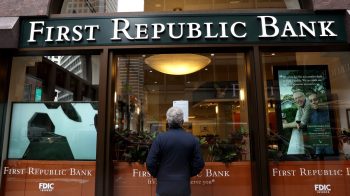How the community bank is different
Jeremy Hobson: We’ve been telling you over the last
couple of weeks about how the big banks did last quarter — or at least, how they say the did. A lot of the profits they’re reporting are pumped up because they’re setting aside less money for losses. Well what about smaller community banks? Eighty four of them have failed this year, and we’ll get earnings from several more today.
Frank Sorrentino is chairman and CEO of North Jersey Community Bank and he joins us now. Good morning.
Frank Sorrentino: Good morning.
Hobson: So when I hear “community bank,” I sort of think of the bank down on the corner that’s still in business of making loans to people and businesses and not involved in a bunch of risky stuff. Is that true?
Sorrentino: That’s pretty much it. Our business plan is very simple: We take in deposits from our local market and we make loans in those same markets to the same people.
Hobson: And that’s a business model that works?
Sorrentino: It does. People don’t realize this, but there are about 7,800 banks in this country, and about 7,500 of those are community banks.
Hobson: Are you being helped or hurt by the Fed’s extremely low interest rate policy?
Sorrentino: Yes. Certainly lower interest rates, you know, I think are good for the economy in general — to a point — so they will help people to refinance and be able to take money that they would normally pay in interest, then put that money back into the economy. But very low interest rates and for a very prolonged period of time will actually hurt bank earnings capabilities, which if banks don’t earn money, they can’t grow and make more loans.
Hobson: The big banks have been in the news a lot in the last couple of weeks about these debit card fees — $5 a month at Bank of America. Are community banks like yours going to have to do the same thing?
Sorrentino: No, I don’t think they will. What you’re seeing the bigger banks do is what they’ve been doing for the last 30 years, which is some bean counter in some office is looking at a spreadsheet, doing an algorithm and just figuring out, ‘how can we get every single last penny out of every one of our clients?’ And when it doesn’t work out the way they’d like because of regulation, then they will shift and move to accommodate their profit models, not their customers.
Hobson: But why wouldn’t you be doing the same thing? If that’s the business model that they feel they need to use, why don’t you do that same thing?
Sorrentino: Because that’s not our business model. Our business model is to take care of our client, and we don’t make decisions across the entire country, across an entire product line. Remember: the profit center for us is more customer relationships.
Hobson: Frank Sorrentino is the chairman and CEO of North Jersey Community Bank. Thanks so much for talking with us.
Sorrentino: You’re very welcome.
There’s a lot happening in the world. Through it all, Marketplace is here for you.
You rely on Marketplace to break down the world’s events and tell you how it affects you in a fact-based, approachable way. We rely on your financial support to keep making that possible.
Your donation today powers the independent journalism that you rely on. For just $5/month, you can help sustain Marketplace so we can keep reporting on the things that matter to you.


















